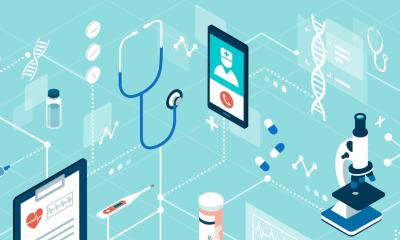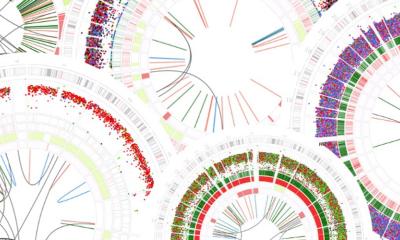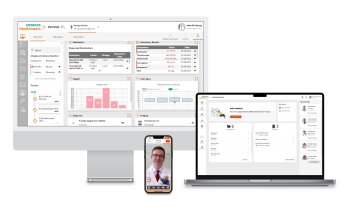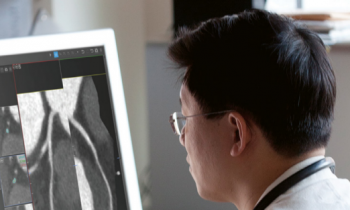Image source: Pexels/Burst
News • Symptom management
eHealth intervention can help cancer patients
Hundreds of cancer patients have benefitted from using computer algorithms to manage their symptoms and improve their wellbeing in a unique UK trial.
The early stage colorectal, breast or gynecological cancer patients took part in the trial of the eRAPID system, developed by the University of Leeds, which allowed them to report online symptoms from home and receive instant advice on whether to self-manage or seek medical attention.
The results of the trial were published in the Journal of Clinical Oncology.
Patients reported better symptom control and physical wellbeing in the early weeks of treatment, with the system preventing symptom deterioration in about 9% of patients after 12 weeks. Patients reported more confidence in managing their health at the end of their four-month trial period. The results demonstrate that improvements to patients' physical wellbeing can be achieved in a cost-effective way without increasing clinicians' workload. It is the first such trial to offer automated advice, and one of only a few to focus mainly on early-stage patients whose treatment aims to cure the cancer.
Programme lead Professor Galina Velikova, at the Leeds Institute of Medical Research at St James's, University of Leeds, and the Leeds Cancer Centre, Leeds Teaching Hospitals NHS Trust, said: "Rising numbers of cancer patients are receiving a range of anti-cancer treatments which means patients are living longer and require longer periods of care and monitoring. Remote online monitoring options have the potential to be a patient-centred, safe and effective approach to support patients during cancer treatment and manage the growing clinical workload for cancer care."
Dr. Kate Absolom, University Academic Fellow in the Leeds Institute of Medical Research at St James's and the Leeds Institute of Health Sciences at the University of Leeds, said: "The encouraging results from this study will help pave the way for future development and refinement of these interventions in broader cancer settings. The Covid-19 pandemic highlighted the need and speeded a shift towards technology-enabled care, so these study results are very timely."
This study provides timely and important evidence that remote real-time monitoring of cancer patients, particularly essential during pandemic conditions, is feasible and can improve patients' physical wellbeing
Julia Brown
Cancer patients can experience a range of symptoms, which can be caused by the cancer itself, by other conditions, or by side effects from chemotherapy and other treatments, which are sometimes life threatening and require emergency hospitalisation. Symptoms can significantly lower patients' quality of life. Better monitoring and management can improve treatment delivery and reduce patients' physical distress.
Funded by the National Institute for Health Research (NIHR), the eRAPID trial set out to establish whether symptom control could be improved using automated advice, to try to improve patients' wellbeing. It included 508 patients aged 18 to 86 who were starting chemotherapy at Leeds Cancer Centre. All patients received their usual care, with 256 receiving the eRAPID system as additional care.
Participants answered a set of cancer specific questions through an online symptom report once a week, or when new symptoms emerged, over the 18-week study period. Using symptom severity grades, a computer algorithm designed by the researchers and clinicians scored all the responses and determined the advice patients received. Questions covered pain levels, nausea, spending time in bed and not meeting family needs. Participants received immediate advice on symptom management or a prompt to contact the hospital. Symptom reports were immediately displayed in the patients' electronic records, and email alerts for severe symptom reports were sent directly to clinicians. A total of 3,314 online reports were completed, reporting 18,867 individual symptoms—an average of 13 reports per patient. Emergency alerts were sent 29 times (under 1%), while serious symptoms not requiring immediate medical attention were reported on 461 occasions (14%). More than 80% of self-reported symptoms triggered self-management advice, providing a cost-effective solution with better outcomes for patients.
Clinical benefits in patients' physical wellbeing were seen particularly at the early period of treatment, between weeks 6 and 12, when challenges in controlling side-effects are expected. The immediate advice increased patient confidence in managing the mild and moderate treatment-related symptoms, which can significantly impact patients' quality of life and ability to continue treatment. And trial data showed no increase in hospital workload, no differences in chemotherapy delivery, and no compromise of patient safety. Julia Brown, Professor of Clinical Trials Research and Director of the University of Leeds Institute of Clinical Trials Research, in the School of Medicine, said: "This study provides timely and important evidence that remote real-time monitoring of cancer patients, particularly essential during pandemic conditions, is feasible and can improve patients' physical wellbeing."
Source: University of Leeds
11.01.2021











